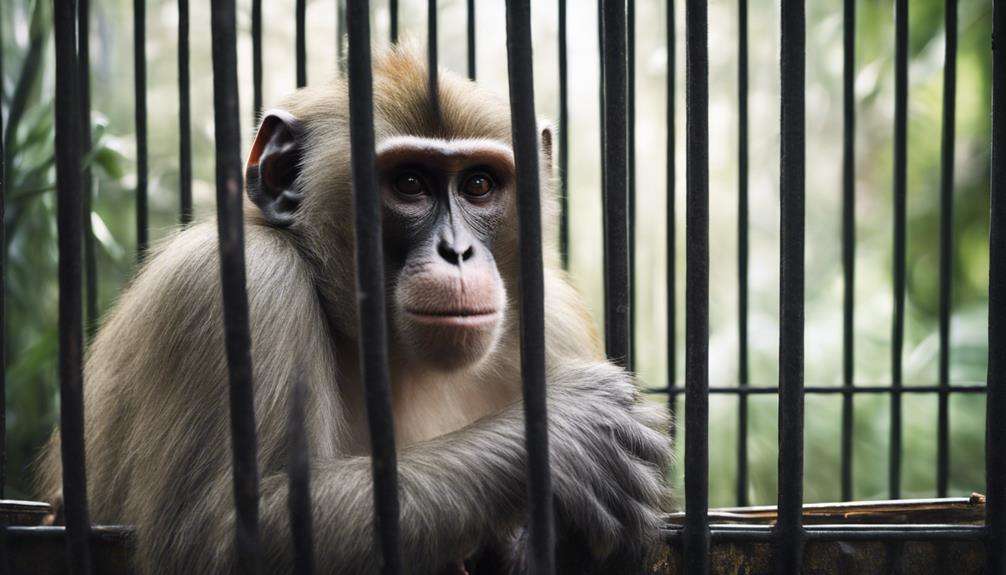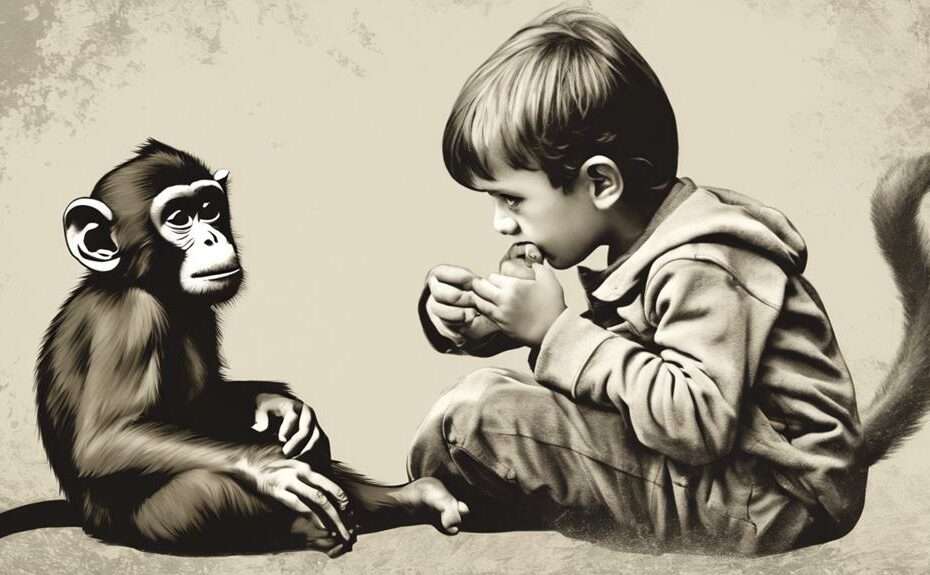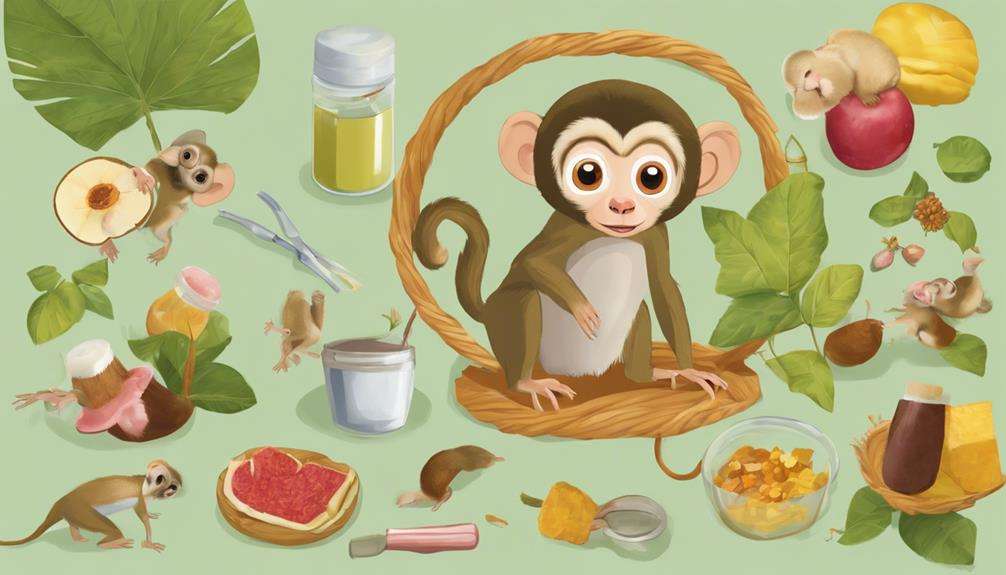Imagine trying to care for a pet that's like a forever toddler; that's the reality of having a primate as a pet. Their complex needs and behaviors are far beyond what a typical child can handle. From their social requirements to the potential health risks they pose, primates simply do not align with what's best for a child's well-being.
But why exactly are primates not suitable pets for children? Let's explore what makes them unique and challenging companions in a domestic setting.
Key Takeaways
- Primates need specific social interactions and space, which are hard to replicate in a home setting.
- Emotional and psychological damage can occur in pet primates due to lack of fulfillment.
- Primate ownership poses risks like aggressive behavior, complex dietary needs, and zoonotic diseases.
- The wild instincts and behaviors of primates make them unsuitable pets for children, risking harm and safety.
Social Interaction Needs of Primates
Primates rely on regular social interactions with their own species for ideal mental health and well-being. Social interaction is a fundamental aspect of primate behavior, playing an important role in their daily lives.
For instance, macaques are known to live in groups ranging from 20 to 50 individuals in their natural habitats. Within these groups, social bonds are formed through grooming, playing, and communication, which are essential for their overall well-being.
Similarly, capuchin monkeys form social groups consisting of 8 to 20 members, engaging in cooperative activities and social behaviors that contribute to their social development and mental stimulation. Gibbons, on the other hand, live in tight-knit family groups that emphasize the importance of social bonds for their emotional stability.
Depriving primates of social interaction can result in emotional distress, behavioral issues, and psychological challenges, highlighting the critical need for adequate social stimulation in their environments. Providing opportunities for social interaction is important for maintaining the mental health and overall well-being of primates.
Space Requirements for Primates
In order to guarantee the well-being of primates in captivity, providing adequate space for their natural behavioral needs is essential. Primates such as macaques and capuchin monkeys require large roaming spaces to thrive. Macaques, known to live in groups of 20-50 in the wild, need ample space for social interactions and hierarchical structures. Similarly, capuchin monkeys, which live in groups of 8-20, require environments that support their group dynamics and social bonding.
Denying primates the necessary space to roam can result in distress and the development of behavioral issues. It's important to understand that the lack of roaming space in domestic settings can't replicate the natural habitat and social structure that primates are accustomed to in the wild. By providing sufficient space for primates to explore, climb, socialize, and exhibit natural behaviors, their overall well-being and quality of life can be greatly improved.
Therefore, when considering the space requirements for primates, it's imperative to prioritize their need for large roaming areas to support their physical and mental health.
Emotional and Psychological Well-being of Primates

From the discussion on space requirements for primates, the emotional and psychological well-being of these animals is vital in ensuring their overall welfare and quality of life.
Primates suffer from emotional distress when deprived of natural interactions with their own kind. The lack of social companionship can lead to agitation and depression in pet primates. Rescue organizations frequently observe long-lasting mental damage in primates that have been kept as pets.
It's essential to understand that the emotional harm inflicted on primates goes beyond their physical well-being. Additionally, some of the psychological damage experienced by pet primates may be irreversible.
It's essential to take into account the emotional and psychological needs of primates before considering them as pets, especially when it comes to the potential risks of emotional distress, lack of social companionship, and the possibility of causing irreversible psychological damage to these intelligent animals.
Potential Risks of Keeping Primates
Considering the inherent risks associated with keeping primates as pets, it's imperative to understand the complexities and challenges involved in caring for these animals. Primates are wild animals with complicated dietary requirements and behaviors that may pose a danger to children. Their aggressive tendencies can lead to serious injuries, especially in a household setting with young individuals. Additionally, meeting the specialized dietary needs of primates can be complex and may not align with a child's ability to provide appropriate nutrition.
In addition to the physical risks, there are also significant concerns related to animal welfare and the fulfillment of primates' complex social needs. Primates thrive in environments that can offer them adequate space, mental stimulation, and social interactions with their own species. These requirements often exceed what a child-centered household can provide, leading to potential stress and behavioral issues in the primate.
Moreover, the transmission of zoonotic diseases such as monkeypox and tuberculosis poses a health risk to children and other family members. Understanding these risks is important in making informed decisions regarding the suitability of primates as pets in a household with children.
Undomesticated Nature of Primates

The undomesticated nature of primates inherently encompasses their innate wild instincts, rendering them unsuitable for domestication. Primates, as wild animals, exhibit behaviors that are deeply rooted in their natural environment. This undomesticated nature can result in unpredictable behavior when kept as pets, posing potential dangers to both the owners and the animals themselves.
Primates have specific social interactions and environmental needs that are challenging to replicate in a home setting. Failing to meet these requirements can lead to stress, aggression, and even physical harm. Due to their wild tendencies, primates aren't suitable companions for children as they may not understand or be able to control the primate's behavior.
It's essential to recognize that despite their sometimes cute and human-like appearances, primates remain fundamentally wild creatures best observed in their natural habitats rather than kept as pets in domestic settings.
Frequently Asked Questions
Why Primates Shouldn't Be Pets?
Primate behavior, legal restrictions, and ethical concerns all converge to highlight why primates shouldn't be pets. Their wild nature, specialized needs, and potential dangers make them unsuitable companions, even for children.
Are Monkeys Good Pets for Kids?
Monkeys are not good pets for kids due to behavior problems, zoonotic diseases, and legal restrictions. They exhibit aggression, require specialized care, and pose safety risks. Understanding these factors is essential before considering a primate as a pet.
What Are the Cons of Having a Pet Monkey?
When considering a pet monkey, be aware of behavioral challenges like aggression, zoonotic diseases that could affect you, and legal restrictions. These factors make owning a primate unsuitable for children.
Is It Safe to Have a Pet Ape?
You think having a pet ape is safe? Think again. Ape behavior is unpredictable, primate aggression is a real concern, and meeting ape care requirements is challenging. Keep yourself and your loved ones safe—avoid pet apes.
Conclusion
To sum up, primates aren't suitable pets for children due to their complex social interaction needs, space requirements, and emotional well-being. They're undomesticated animals with specific dietary needs and aggressive tendencies.
Did you know that approximately 90% of primates kept as pets experience behavioral issues due to improper care and environment?
It's important to prioritize the well-being of these animals by not keeping them as pets.






